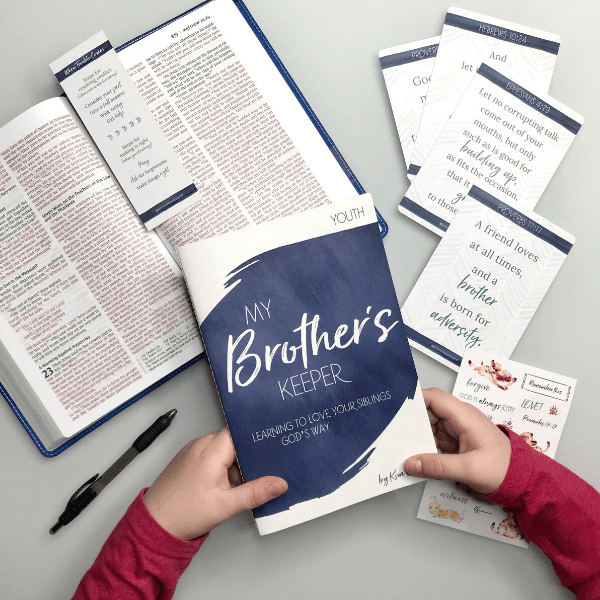Dealing with Sibling Rivalry in the Christian Home
Dealing with sibling rivalry doesn't have to be stressful. Biblical principles should always guide our parenting, and that includes how we teach our children to treat their siblings.
“But I wanted the blue cup!”
“I had this toy first!”
“Stop doing that!”
These are phrases every parent with multiple children hears.
How do you teach your children to just stop it already?
I'm not going to pretend to be a perfect parent or to know all the answers, but when you're dealing with situations from a Biblical perspective, I can tell you you're not going to go wrong.
Dealing with our children's hearts is so much more important than simply changing their behavior.
Breaking up sibling bickering is no different.
Instead of asking “Who had the toy first?” the question should address the heart issue – “Are you thinking of others or yourself?”
If you find yourself constantly breaking up arguments between your children, here is what I recommend:
First, sit your children down and teach them from Scripture what God says about our relationships with others.
For example, he teaches us to be kind and to forgive when someone has wronged us (Ephesians 4:32); to put others before ourselves (Philippians 2:4), to be nice even if the other person is being mean to us (Matthew 5:44), and to do everything in our power to be at peace with others (Romans 12:18).
You'll want to give practical examples of what these things mean and help your child understand how he can apply them in his own life. For example:
“If your brother yells at you, according to the Bible, is yelling back at him the right thing to do?”
“What are some ways you could put your sister first?”
Parenting should be proactive rather than reactive.
We need to foresee the things our children will face and teach them ahead of time what the Bible says. Then when the situation arises, we can simply remind our children of what they've already learned.
When an argument arises between your children, which is easier? To say, “How can you put others first in this situation?” Or to try to do an impromptu Bible lesson right there while the only thing your children want to hear about is who you're going to let have the blue cup?
If you need a little more guidance in teaching your children about the subject of sibling rivalry or you want something that will reinforce the concepts you're teaching them, I recommend this study for kids called My Brother's Keeper: Learning to Love Your Siblings God's Way

When I saw that Kim had come out with this new study, I asked her if I could have a copy to review so I could use it with my own kids and tell you all about it.
I love how attractive the graphics are! Appealing artwork always makes learning more fun! But beyond that, it is very in-depth and completely based on scripture. Over the course of 4 weeks we'll be studying 10 different sets of siblings as we learn about God's design for families.
After you have proactively taught your children what God's Word says about how they should treat others, including their siblings, you will need lots of positive reinforcement once those situations arise.
Instead of deciding who gets the biggest piece of cake, help your children decide it themselves. Ask, “How can you each think of others in this situation?”
You may be surprised that after a while they will start to offer first choice to their sibling without even being reminded because they are learning what God wants for their life. They are learning that they are happy when they choose to put others first.
Will they ever be selfish? Yes, they still have a sin nature just like the rest of us.
But you will find that addressing the heart of the matter will help them make their own choice to be kind to their siblings instead of your constantly having to make them do it.
How are you going to be proactive in your parenting? What do you need to intentionally teach your child?

